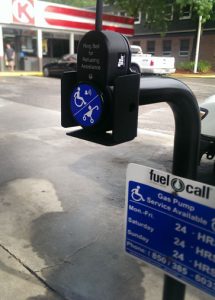
This month, pumping gas in Leon County has gotten a whole lot easier for anyone living with a disability. If you have a legal, disabled placard visibly displayed in/on your vehicle, you can NOW pull up to AREA Leon County gas stations and someone on staff will come out and pump your gas for you.
Is pumping gas difficult for you? Do you rely on others to help you fuel your vehicle? While we here at Advanced Driving Systems try to make driving mobility easy for every disability there are limitations to what the best wheelchair ramps, wheelchair lifts and drive control systems can offer.
This month, pumping gas in Leon County has gotten a whole lot easier for anyone living with a disability. If you have a legal, disabled placard visibly displayed in/on your vehicle, you can NOW pull up to AREA Leon County gas stations and someone on staff will come out and pump your gas for you.
“This is a dignified way to get assistance from the people who run the store,” Advanced Driving Systems Client J.R. Harding said.
Harding, a quadriplegic himself, has been after local and state leaders to install local phone numbers and the new fuel call buttons at gas stations for the last six years.
The Leon County Commission finally heard Harding’s pleas in October 2013 and passed an ordinance requiring local phone numbers and fuel call buttons to be installed at all new gas stations, as well as all stations that re-model within the county. For gas stations already in existence, only those that can offer gas service to 10 cars or more at the same time have to comply with the new Leon County ordinance. Harding said that is roughly half of the gas stations within the county, approximately 95 stations in all.
Hours for this new service vary from station to station; many will offer 24 hour service. Each call button comes with a sign posting hours of service, as well as a local phone number you can call if you are not able to press the button itself. However, if there is ever any doubt to the hours of operation for a fuel call button, just press the button itself and a recording will come on telling you what hours services are offered.
The state passed a similar law to the Leon County ordinance in July 2014 requiring all self-service gas stations in Florida, by 2016, have a local phone number installed, so a person with a disability can call and access someone to pump their gas. Harding is happy to see the state take action but feels this new law puts the burden on the person with the disability rather than the business owner. He also points out that just because a person with a disability can drive, doesn’t mean they can dial a phone number.
Harding believes these new fuel call buttons offer people living with disabilities a greater independence, proving their time is equally important and should be valued like everyone else’s. “I believe this shows that the American Disabilities Act is continuing to shape our community and our places of service and accommodations.”
“First, we got the ramps, parking spaces, doors and bathrooms,” he said. “Now, we are starting to put ourselves on roller coasters. We are getting on cruise ships. This SMART technology is evolving, but some of our basic needs, like gas, are slow to evolve. If you can’t get gas, how can you get to work? How do you run your errands? To me, this is a dignified way of accessing help and facilitating commerce between two populations that previously weren’t doing it, and they will be doing it with a level of respect, equality and dignity.”
Still, Harding would like to take this issue further. He points to barriers with the new ordinance/law, like how the gas being pumped will be paid for. He’d like to see people be able to register with Shell, Circle K or BP, a system where credit card information could be stored on file. “We could then call the station up and say, ‘Hey, I’m going to be at your store in five minutes. Oh, by the way, get me a Coke and a candy bar.’ The receipt then shows up in your email box, just like other electronic transactions.”







